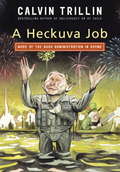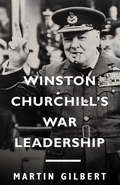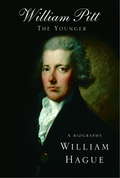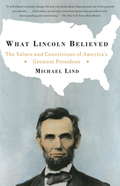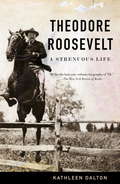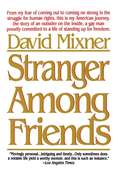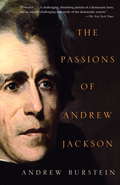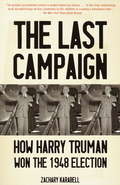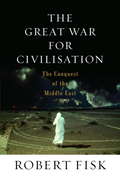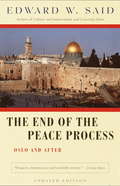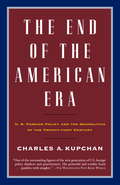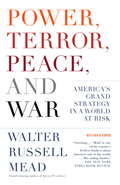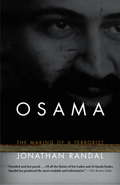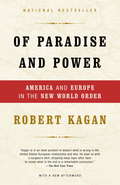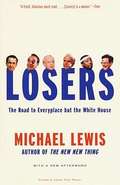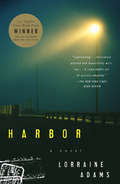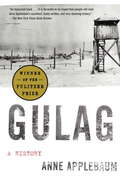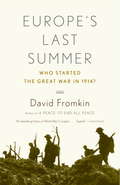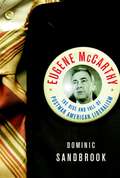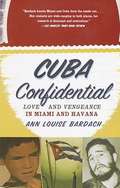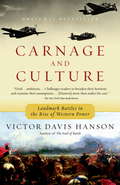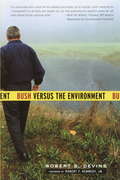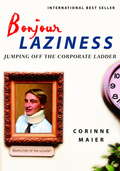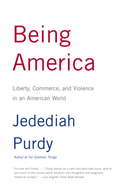- Table View
- List View
A Heckuva Job
by Calvin TrillinSomehow, despite everything Calvin Trillin wrote about the Bush Administration in Obliviously On He Sails, his 2004 bestseller in verse, George W. Bush is still in the White House. Taking a philosophical view, Trillin has said, "We weren't going to know whether you could bring down a presidency with iambic pentameter until somebody tried it."Now Trillin is trying again, back at his pithy and hilarious best to comment on the President's decision to go to war in Iraq ("Then terrorists could count on what we'd do: / Attack us, we'll strike back, though not at you"), his religiosity ("He treats his critics in the press / As if they're yapping Pekineses. / Reporters deal in mundane facts; / This man has got the word from Jesus"), and whether he was wearing a transmitting device in the first presidential debate ("Could this explain his odd expressions? Is there proof he / Was being told, 'If you can hear me now, look goofy'?")Trillin deals with the people around Bush, such as Nanny Dick Cheney and Mushroom Cloud Rice and Orange John Ashcroft and Orange John's successor, Alberto Gonzales ("The A.G.'s to be one Alberto Gonzales- / Dependable, actually loyal über alles"). He tries to predict the behavior of the famously intemperate John Bolton as ambassador to the United Nations in poems with titles like "Bolton Chases French Ambassador Up Tree" and "White House Says Bolton Can Do Job Even While in Straitjacket."Finally, in dealing with whether the entire Bush Administration, like the unfortunate Brownie, has done a heckuva job, he composes a small-government sea chantey for the Republicans:'Cause government's the problem, lads,Americans would all do well to shun it.Yes, government's the problem, lads.At least it is when we're the ones who run it.From the Hardcover edition.
Winston Churchill's War Leadership
by Martin GilbertHow does he assess the information that is brought to him? How does his personal or political philosophy, or a moral sense, sustain him? How does he draw inspiration from those around him? How does he deal with setbacks and disasters? In this brilliant close-up look at Winston Churchill's leadership during the Second World War, Gilbert gets to the heart of the trials and struggles that have confronted the world's most powerful leaders, even up to current politicians such as George Bush and Tony Blair.Basing the book on his intimate knowledge of Churchill's private and official papers, Sir Martin Gilbert, Churchill's official biographer, looks at the public figure and wartime propaganda, to reveal a very human, sensitive, and often tormented man, who nevertheless found the strength to lead his nation forward from the darkest and most dangerous of times.From the Trade Paperback edition.
William Pitt the Younger
by William HagueThe Sunday Times bestselling biography of one of the towering figures in British history who became Prime Minister at the age of twenty-four, written by the youngest-ever leader of the Tory Party.
What Lincoln Believed: The Values and Convictions of America's Greatest President
by Michael LindFew biographers and historians have taken Lincoln's ideas seriously or placed him in the context of major intellectual traditions. InWhat Lincoln Believed, the most comprehensive study ever written of the thought of America's most revered president, Michael Lind provides a resource to the public philosophy that guided Lincoln as a statesman and shaped the United States. Although he is often presented as an idealist dedicated to political abstractions, Lincoln was a pragmatic politician with a lifelong interest in science, technology, and economics. Throughout his career he was a disciple of the Kentucky senator Henry Clay, whose "American System" of government support for industrial capitalism Lincoln promoted when he served in the Illinois statehouse, the U. S. Congress, and the White House. Today Lincoln is remembered for his opposition to slavery and his leadership in guiding the Union to victory in the Civil War. But Lincoln's thinking about these subjects is widely misunderstood. His deep opposition to slavery was rooted in his allegiance to the ideals of the American Revolution. Only late in his life, however, did Lincoln abandon his support for the policy of "colonizing" black Americans abroad, which he derived from Henry Clay and Thomas Jefferson. Lincoln and most of his fellow Republicans opposed the extension of slavery outside of the South because they wanted an all-white West, not a racially integrated society. Although the Great Emancipator was not the Great Integrationist, he was the Great Democrat. In an age in which many argued that only whites were capable of republican government, Lincoln insisted on the universality of human rights and the potential for democracy everywhere. In a century in which liberal and democratic revolutions against monarchy and dictatorship in Europe and Latin America repeatedly had failed, Lincoln believed that liberal democracy as a form of government was on trial in the American Civil War. "Our popular government has often been called an experiment," Lincoln told the U. S. Congress, insisting that the American people had to prove to the world that "when ballots have fairly, and constitutionally, decided, there can be no successful appeal, back to bullets. " If the United States fell apart after the losers in an election took up arms, then people everywhere might conclude that democracy inevitably led to anarchy and "government of the people, by the people, for the people" might well "perish from the earth. " "He loved his country partly because it was his own country, but mostly because it was a free country. " What Lincoln said of Henry Clay could be said of him as well. InWhat Lincoln Believed, Michael Lind shows the enduring relevance of Lincoln's vision of the United States as a model of liberty and democracy for the world.
Theodore Roosevelt: A Strenuous Life
by Kathleen DaltonTheodore Roosevelt made himself the hero of his own strenuous life. He transformed himself from a sickly and fearful patrician boy into a fiercely adventurous--and always active--hunter, sportsman, writer, politician, and finally president. But one self-making was never enough for TR. He slowly fashioned himself into a man of the people, a defender of the poor and downtrodden, and a prophet of political ideas advanced for his day. This is the story of his personal and political development, of one man's struggle to conquer his own fears and to build a greater nation out of a divided collection of states. He urged America to engage life to the utmost, as he did. Kathleen Dalton's Theodore Roosevelt: A Strenuous Life incorporates the latest scholarship into a vigorous narrative. It stands as the only full-length biography to use manuscripts recently discovered in Roosevelt attics. Dalton sheds new light on young Theodore's life during the Civil War and his fascination with the new natural history, his shame over his father's failure to enlist in the Union army, his struggle to achieve manhood, and his desperate pursuit of and sometimes less than idyllic marriage to Alice Hathaway Lee, the daughter of a banking magnate, when she was seventeen. Her death four years later left Roosevelt a grieving widower and father at twenty-six, and he went west to make himself a cowboy and western writer, before he could recommit himself to a new life and a new love in the East. No other biographer has described how formative Roosevelt's marriage to Edith Carow proved to be in shaping his political career. In an account that may be compared with Joseph Lash's Eleanor and Franklin, Dalton demonstrates how Edith and Theodore's marriage, with its ups and downs, remade our history. In partnership with Massachusetts political mastermind Henry Cabot Lodge, Edith served as her husband's advisor, image builder, conscience, and at times censor. Dalton unravels the complex relationship between Roosevelt's initial political conservatism and the growing mood of progressivism that swept the nation in the early 1900s. He found unlikely allies among the army of women reformers who campaigned for pure milk and clean streets in the cities, and by 1912 he had become an active suffragist. Out of this biography emerges a new picture of the Progressive Era, of state-building and reform won in partnership between TR and activists such as Jane Addams and Frances Kellor. In his political maturity Roosevelt aspired to be the builder of the modern American welfare state in order to give industrial workers a better life and at the same time to stand up more forcefully against the arrogance and greed of large corporations. Dalton shows how TR called for a revival of American arts and letters, and how his career as a scientist affected his reform program and his views on race, and how toward the end of his life he finally commited himself to the cause of racial equality. Both an updated political interpretation and an intimate personal story of a loving but difficult man, his wife, his family, and his loyal friends, Theodore Roosevelt: A Strenuous Life will change persuasively the way we see this great and complex man and his times. From the Hardcover edition.
Stranger Among Friends
by David Mixner"From my fear of coming out to coming on strong in the struggle for human rights, this is my American journey, the story of an outsider on the inside, a gay man proudly committed to a life of standing up for freedom."<P> "President Clinton and I were born three days apart. We had both dreamed of serving our country. There was one difference: He could pursue his dream, while I felt I could not. The President was born straight and I was born gay."<P> In this stirring personal history, one of America's most influential gay rights advocates recounts his extraordinary career as a policy maker and adviser to the major political leaders of our time, and his own often anguishing, ultimately triumphant life as a gay man. A longtime personal friend of Bill Clinton, inStranger Among FriendsDavid Mixner offers an insider's look at the power struggles that occur every day in our nation's capital and candid insights on the Clinton administration's successes and failures. Spanning three decades of human rights activism--from the behind-the-scenes negotiations to the painful betrayals to the hard-won victories--his forthright story unflinchingly explores what it means to be an outsider on the inside, and sends a message of hope to all who have ever stood up for what they believe.
The Passions of Andrew Jackson
by Andrew BursteinMost people vaguely imagine Andrew Jackson as a jaunty warrior and a man of the people, but he was much more--a man just as complex and controversial as Jefferson or Lincoln. Now, with the first major reinterpretation of his life in a generation, historian Andrew Burstein brings back Jackson with all his audacity and hot-tempered rhetoric. The unabashedly aggressive Jackson came of age in the Carolinas during the American Revolution, migrating to Tennessee after he was orphaned at the age of fourteen. Little more than a poorly educated frontier bully when he first opened his public career, he was possessed of a controlling sense of honor that would lead him into more than one duel. As a lover, he fled to Spanish Mississippi with his wife-to-be before she was divorced. Yet when he was declared a national hero upon his stunning victory at the Battle of New Orleans, Jackson suddenly found the presidency within his grasp. How this brash frontiersman took Washington by storm makes a fascinating story, and Burstein tells it thoughtfully and expertly. In the process he reveals why Jackson was so fiercely loved (and fiercely hated) by the American people, and how his presidency came to shape the young country's character.
The Last Campaign
by Zachary KarabellIn the presidential campaign of 1948, Americans had a choice across the ideological spectrum, from the far Right to the far Left. This account tells the story of all four candidates' campaigns, and argues that this was the last time a presidential race was dominated by radio and print media, and the last time that progressive and Left points of view were debated and covered in the mainstream press. The author has taught at Harvard, the University of Massachusetts, and Dartmouth. His essays have appeared in newspapers and national publications. Annotation c. Book News, Inc. , Portland, OR (booknews. com)
The Great War for Civilisation
by Robert FiskA sweeping and dramatic history of the last half century of conflict in the Middle East from an award-winning journalist who has covered the region for over thirty years, The Great War for Civilisation unflinchingly chronicles the tragedy of the region from the Algerian Civil War to the Iranian Revolution; from the American hostage crisis in Beirut to the Iran-Iraq War; from the 1991 Gulf War to the American invasion of Iraq in 2003. A book of searing drama as well as lucid, incisive analysis, The Great War for Civilisation is a work of major importance for today's world.From the Trade Paperback edition.
The End of the Peace Process: Oslo and After
by Edward W. SaidA collection of essays by literary and cultural critic, Edward W. Said. It provides a commentary on the peace process in the last six years of the 20th century, in which Said has been virtually a lone voice in the West supporting the rights of the Palestinian people. Now revised and updated by the author.
The End of the American Era: U. S. Foreign Policy and the Geopolitics of the Twenty-first Century
by Charles KupchanRefuting the conventional wisdom that the end of the Cold War cleared the way for an era of peace and prosperity led solely by the United States, Charles A. Kupchan contends that the next challenge to America's might is fast emerging. It comes not from the Islamic world or an ascendant China, but from an integrating Europe that is rising as a counterweight to the United States. Decades of strategic partnership across the Atlantic are giving way to renewed geopolitical competition. The waning of U.S. primacy will be expedited by America's own ambivalence about remaining the globe's guardian and by the impact of the digital age on the country's politics and its role in the world. By deftly mining the lessons of history to cast light on the present and future, Kupchan explains how America and the world should prepare for the more complex, more unstable road ahead.From the Trade Paperback edition.
Stalin: The Court of the Red Tsar (Orion 20th Anniversary Editions Ser.)
by Simon Sebag MontefioreThis widely acclaimed biography provides a vivid and riveting account of Stalin and his courtiers--killers, fanatics, women, and children--during the terrifying decades of his supreme power. In a seamless meshing of exhaustive research and narrative ?lan, Simon Sebag Montefiore gives us the everyday details of a monstrous life.We see Stalin playing his deadly game of power and paranoia at debauched dinners at Black Sea villas and in the apartments of the Kremlin. We witness first-hand how the dictator and his magnates carried out the Great Terror and the war against the Nazis, and how their families lived in this secret world of fear, betrayal, murder, and sexual degeneracy. Montefiore gives an unprecedented understanding of Stalin's dictatorship, and a Stalin as human and complicated as he is brutal.From the Trade Paperback edition.otov, Beria and Yezhov among them-the author sheds new light on the oligarchy that attempted to create a new world by exterminating the old. He gives us the details of their quotidian and monstrous lives: Stalin's favorites in music, movies, literature (Hemmingway, The Forsyte Saga and The Last of the Mohicans were at the top of his list), food and history (he took Ivan the Terrible as his role model and swore by Lenin's dictum, "A revolution without firing squads is meaningless"). We see him among his courtiers, his informal but deadly game of power played out at dinners and parties at Black Sea villas and in the apartments of the Kremlin. We see the debauchery, paranoia and cravenness that ruled the lives of Stalin's inner court, and we see how the dictator played them one against the other in order to hone the awful efficiency of his killing machine.With stunning attention to detail, Montefiore documents the crimes, small and large, of all the members of Stalin's court. And he traces the intricate and shifting web of their relationships as the relative warmth of Stalin's rule in the early 1930s gives way to the Great Terror of the late 1930s, the upheaval of World War II (there has never been as acute an account of Stalin's meeting at Yalta with Churchill and Roosevelt) and the horrific postwar years when he terrorized his closest associates as unrelentingly as he did the rest of his country.Stalin: The Court of the Red Tsar gives an unprecedented understanding of Stalin's dictatorship, and, as well, a Stalin as human and complicated as he is brutal. It is a galvanizing portrait: razor-sharp, sensitive and unforgiving.From the Hardcover edition.
Power, Terror, Peace, and War
by Walter Russell MeadInternational affairs expert and award-winning author of Special Providence Walter Russell Mead here offers a remarkably clear-eyed account of American foreign policy and the challenges it faces post--September 11.Starting with what America represents to the world community, Mead argues that throughout its history it has been guided by a coherent set of foreign policy objectives. He places the record of the Bush administration in the context of America's historical relations with its allies and foes. And he takes a hard look at the international scene-from despair and decay in the Arab world to tumult in Africa and Asia-and lays out a brilliant framework for tailoring America's grand strategy to our current and future threats. Balanced, persuasive, and eminently sensible, Power, Terror, Peace, and War is a work of extraordinary significance on the role of the United States in the world today.From the Trade Paperback edition. Central Asia--threatens to create lawless, violent zones where terrorism can thrive, and weapons of mass destruction and biological and chemical weapons can proliferate.We learn why key American alliances have frayed and why the Bush administration's pronouncements and actions have ignited the most acrimonious U.S. political battles over foreign policy since the Vietnam War. Mead closes with a rigorous assessment of both Bush and his critics, and describes the urgent steps the United States must take lest casualties in the war on terror mount and the war itself spin out of control. He proposes a new approach to the war that can rebuild domestic and international support for a tough antiterror policy, outlines a new initiative for the Israeli-Palestinian dispute, and recommends sweeping changes for reforming international institutions, including the United Nations Security Council.Power, Terror, Peace, and War is a clear, concise guide to some of the most pressing issues before us, today and for the foreseeable future.From the Hardcover edition.
Osama
by Jonathan RandalHow is it possible for one middle-aged Saudi millionaire to threaten the world’s only superpower? This is the question at the center of Jonathan Randal’s riveting, timely account of Osama bin Laden’s role in the rise of terrorism in the Middle East. Randal–a journalist whose experience of the Middle East spans the past forty years–makes clear how Osama’s life epitomizes the fatal collision between twenty-first-century Islam and the West, and he describes the course of Osama’s estrangement from both the West and the Saudi petro-monarchy of which his family is a part. He examines Osama’s terrorist activities before September 11, 2001, and shows us how, after the attack on the World Trade Center, Osama presented the West with something new in the annals of contemporary terrorism: an independently wealthy entrepreneur with a seemingly worldwide following ready to do his bidding. Randal explores the possibility that Osama offered the Saudis his Al-Qaeda forces to drive Saddam Hussein out of Kuwait in 1991; he traces the current sources of Osama’s money; and he tells us why the Iraq war has played into the hands of the terrorists. With his long-maintained sources in the Middle East and his intimate understanding of the region, Randal gives us a clearer explanation than any we have had of the whys and wherefores of the world’s most prominent and feared terrorist.
Of Paradise and Power
by Robert KaganAt a time when relations between the United States and Europe are at their lowest ebb since World War II, this brief but cogent book is essential reading. Robert Kagan, a leading scholar of American foreign policy, forces both sides to see themselves through the eyes of the other. Europe, he argues, has moved beyond power into a self-contained world of laws, rules, and negotiation, while America operates in a "Hobbesian" world where rules and laws are unreliable and military force is often necessary.Tracing how this state of affairs came into being over the past fifty years and fearlessly exploring its ramifications for the future, Kagan reveals the shape of the new transatlantic relationship. The result is a book that promises to be as enduringly influential as Samuel Huntington's The Clash of Civilizations. From the Trade Paperback edition.
Losers: The Road to Everyplace but the White House
by Michael LewisA wickedly funny and astute chronicle of the 1996 presidential campaign--and how we go about choosing our leaders at the turn of the century. In it Michael Lewis brings to the political scene the same brilliance that distinguished his celebrated best-seller about the financial world, Liar's Poker.
Harbor
by Lorraine AdamsA powerful first novel that engages the tumultuous events of today: at once an intimate portrait of a group of young Arab Muslims living in the United States, and the story of one man's journey into-and out of-violence. We first meet Aziz Arkoun as a 24-year-old stowaway-frozen, hungry, his perceptions jammed by a language he can't understand or speak. After 52 days in the hold of a tanker from Algeria, he jumps into the icy waters of Boston harbor and swims to shore. Seemingly rescued from isolation by Algerians he knew as a child, he instead finds himself in a world of disillusionment, duplicity, and stolen identities, living a raw comedy of daily survival not unlike what he fled back home. As the story of Aziz and his friends unfolds-moving from the hardscrabble neighborhoods of East Boston and Brooklyn to a North African army camp-Harbormakes vivid the ambiguities of these men's past and present lives: burying a murdered girl in the Sahara; reading medieval Persian poetry on a bus, passing for Mexican; shoplifting Versace for clubbing, succumbing to sex in a public library; impersonating a double agent. But when Aziz begins to suspect that he and his friends are under surveillance, all assumptions-his and ours-dissolve in an urgent, mesmerizing complexity. And asHarborraces to its explosive conclusion, it compels us to question the questions it raises: Who are the terrorists? Can we recognize them? How do they live? A debut novel as evocative as it is convincing-a groundbreaking work that announces a fearless new voice in American fiction. From the Hardcover edition.
Gulag: A History
by Anne ApplebaumPULITZER PRIZE WINNER • This magisterial and acclaimed history offers the first fully documented portrait of the Gulag, from its origins in the Russian Revolution, through its expansion under Stalin, to its collapse in the era of glasnost.&“A tragic testimony to how evil ideologically inspired dictatorships can be.&” –The New York Times The Gulag—a vast array of Soviet concentration camps that held millions of political and criminal prisoners—was a system of repression and punishment that terrorized the entire society, embodying the worst tendencies of Soviet communism. Applebaum intimately re-creates what life was like in the camps and links them to the larger history of the Soviet Union. Immediately recognized as a landmark and long-overdue work of scholarship, Gulag is an essential book for anyone who wishes to understand the history of the twentieth century.
Europe's Last Summer: Who Started the Great War in 1914?
by David FromkinThe Great War not only destroyed the lives of over twenty million soldiers and civilians, it also ushered in a century of huge political and social upheaval, led directly to the Second World War and altered for ever the mechanisms of governments. And yet its causes, both long term and immediate, have continued to be shrouded in mystery. In EUROPE'S LAST SUMMER, David Fromkin reveals a new pattern in the happenings of that fateful July and August, which leads in unexpected directions. Rather than one war, starting with the assassination of Archduke Franz Ferdinand, he sees two conflicts, related but not inseparably linked, whose management drew Europe and the world into what The Economist described as early as 1914 as 'perhaps the greatest tragedy in human history'.
Eugene McCarthy: The Rise and Fall of Postwar American Liberalism
by Dominic SandbrookOriginally a New Deal liberal and aggressive anticommunist, Senator Eugene McCarthy famously lost faith with the Democratic party over Vietnam. His stunning challenge to Lyndon Johnson in the 1968 New Hampshire primary inspired young liberals and was one of the greatest electoral upsets in American history. But the 1968 election ultimately brought Richard Nixon and the Republican Party to power, irrevocably shifting the country's political landscape to the right for decades to come. Dominic Sandbrook traces one of the most remarkable and significant lives in postwar politics, a career marked by both courage and arrogance. Sandbrook draws on extensive new research - including interviews with McCarthy himself - to show convincingly how Eugene McCarthy's political experience embodies the larger decline of American liberalism after World War II. These were tumultuous times in American politics, and Sandbrook vividly captures the drama and historical significance through his intimate portrait of a singularly interesting man at the heart of it all.From the Trade Paperback edition.
Cuba Confidential: Love and Vengeance in Miami and Havana
by Ann Louise BardachCuba Confidential is a gripping account of the bloody vendetta between Miami and Havana since Fidel Castro first came to power in 1959. Award-winning investigative journalist Ann Louise Bardach brings together a decade of first-hand access to the crooks, spies and politicians who have made US-Cuban history - from Castro and his would-be assassin Luis Posada Carriles to the inner circles of Florida Governor Jeb Bush and embattled leaders of the exiled Cuban community in Miami. Exposing hardball tactics on both sides of the conflict and the devastating human consequences and shattered families in its wake, Bardach has created an unforgettable portrait of Cuba, its citizens and exiles.
Carnage and Culture: Landmark Battles in the Rise to Western Power
by Victor Davis HansonExamining nine landmark battles from ancient to modern times--from Salamis, where outnumbered Greeks devastated the slave army of Xerxes, to Cortes’s conquest of Mexico to the Tet offensive--Victor Davis Hanson explains why the armies of the West have been the most lethal and effective of any fighting forces in the world.Looking beyond popular explanations such as geography or superior technology, Hanson argues that it is in fact Western culture and values–the tradition of dissent, the value placed on inventiveness and adaptation, the concept of citizenship–which have consistently produced superior arms and soldiers. Offering riveting battle narratives and a balanced perspective that avoids simple triumphalism, Carnage and Culture demonstrates how armies cannot be separated from the cultures that produce them and explains why an army produced by a free culture will always have the advantage.
Bush Versus the Environment
by Robert S. DevineSince becoming president, George W. Bush has walked away from the Kyoto Protocol, pushed for oil drilling in the Arctic National Wildlife Refuge, undermined protections for endangered species and wilderness, and retreated from his campaign pledge to regulate carbon dioxide. But the president’s agenda reaches deeper than these well-known policies. InBush Versus the Environment, Robert Devine shows how the White House is quietly undermining the entire system of environmental safeguards that has developed over the past thirty years. The administration's tactics include: -Encouraging lawsuits against the federal government that challenge existing environmental laws, and then feebly defending the cases in court. -Ignoring science that doesn’t support the president's goals, and pressuring government scientists to produce the results the administration wants. -Using fuzzy math to overestimate the costs and underestimate the benefits of regulations that protect human health and the environment, which can lead to the elimination of much-needed rules. These are just a few of the administration’s strategies, which are being pursued beneath the radar of a public that overwhelmingly supports environmental protections. Bush Versus the Environmentis a compelling and important look at one of the most important issues facing America today, one that will have consequences that last long after Bush has left office. From the Trade Paperback edition.
Bonjour Laziness
by Corinne MaierYour company wants you to be loyal. You should feel lucky-after all, your job is a privilege (think of all those who would like to have it). And you know (despite what you've read about Enron and WorldCom) that management has your best interests at heart. Your goal is to devote yourself to the pursuit of corporate profit, make your company number one, and reap the benefits of its success. Or is there something else you want to do with your life? Bonjour Laziness dares to ask whether you really have a stake in the corporate sweepstakes, whether professional mobility is anything but an opiate. It shows you how to become impervious to manipulation and escape the implacable law of usefulness. In short, this book explains why it is in your best interest to work as little as possible.
Being America
by Jedediah PurdyPurdy asks how modern liveshe sees America (the US) as the paragonproduce both liberty and violence, what the proportion of freedom to exploitation is in the economy, which political realms encourage people to feel control over their choices and which incite popular passions to flirt with chaos or dictatorship, and which inflections of a culture help its members live with dignity and which erode it. Annotation ©2004 Book News, Inc. , Portland, OR (booknews. com)
